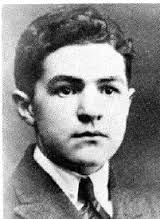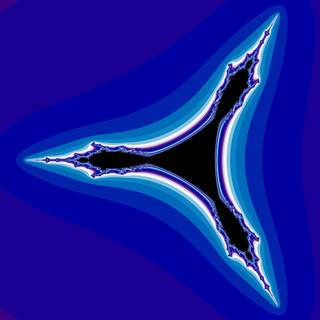Related Research Articles
Noncommutative geometry (NCG) is a branch of mathematics concerned with a geometric approach to noncommutative algebras, and with the construction of spaces that are locally presented by noncommutative algebras of functions, possibly in some generalized sense. A noncommutative algebra is an associative algebra in which the multiplication is not commutative, that is, for which does not always equal ; or more generally an algebraic structure in which one of the principal binary operations is not commutative; one also allows additional structures, e.g. topology or norm, to be possibly carried by the noncommutative algebra of functions.
Complex dynamics, or holomorphic dynamics, is the study of dynamical systems obtained by iterating a complex analytic mapping. This article focuses on the case of algebraic dynamics, where a polynomial or rational function is iterated. In geometric terms, that amounts to iterating a mapping from some algebraic variety to itself. The related theory of arithmetic dynamics studies iteration over the rational numbers or the p-adic numbers instead of the complex numbers.

Mojżesz Presburger, or Prezburger, was a Polish Jewish mathematician, logician, and philosopher. He was a student of Alfred Tarski, Jan Łukasiewicz, Kazimierz Ajdukiewicz, and Kazimierz Kuratowski. He is known for, among other things, having invented Presburger arithmetic as a student in 1929 – a form of arithmetic in which one allows induction but removes multiplication, to obtain a decidable theory.
In mathematics, an IP set is a set of natural numbers which contains all finite sums of some infinite set.
In mathematics, ergodicity expresses the idea that a point of a moving system, either a dynamical system or a stochastic process, will eventually visit all parts of the space that the system moves in, in a uniform and random sense. This implies that the average behavior of the system can be deduced from the trajectory of a "typical" point. Equivalently, a sufficiently large collection of random samples from a process can represent the average statistical properties of the entire process. Ergodicity is a property of the system; it is a statement that the system cannot be reduced or factored into smaller components. Ergodic theory is the study of systems possessing ergodicity.

In mathematics, the tricorn, sometimes called the Mandelbar set, is a fractal defined in a similar way to the Mandelbrot set, but using the mapping instead of used for the Mandelbrot set. It was introduced by W. D. Crowe, R. Hasson, P. J. Rippon, and P. E. D. Strain-Clark. John Milnor found tricorn-like sets as a prototypical configuration in the parameter space of real cubic polynomials, and in various other families of rational maps.
Arithmetic dynamics is a field that amalgamates two areas of mathematics, dynamical systems and number theory. Part of the inspiration comes from complex dynamics, the study of the iteration of self-maps of the complex plane or other complex algebraic varieties. Arithmetic dynamics is the study of the number-theoretic properties of integer, rational, p-adic, or algebraic points under repeated application of a polynomial or rational function. A fundamental goal is to describe arithmetic properties in terms of underlying geometric structures.
The mathematical disciplines of combinatorics and dynamical systems interact in a number of ways. The ergodic theory of dynamical systems has recently been used to prove combinatorial theorems about number theory which has given rise to the field of arithmetic combinatorics. Also dynamical systems theory is heavily involved in the relatively recent field of combinatorics on words. Also combinatorial aspects of dynamical systems are studied. Dynamical systems can be defined on combinatorial objects; see for example graph dynamical system.

Elon Lindenstrauss is an Israeli mathematician, and a winner of the 2010 Fields Medal.

Mikhail (Misha) Lyubich is a mathematician who has made important contributions to the fields of holomorphic dynamics and chaos theory.
Amie Wilkinson is an American mathematician and Professor of Mathematics at the University of Chicago. Her research topics include smooth dynamical systems, ergodic theory, chaos theory, and semisimple Lie groups. Wilkinson, in collaboration with Christian Bonatti and Sylvain Crovisier, partially resolved the twelfth problem on Stephen Smale's list of mathematical problems for the 21st Century.
William A. Veech was the Edgar O. Lovett Professor of Mathematics at Rice University until his death. His research concerned dynamical systems; he is particularly known for his work on interval exchange transformations, and is the namesake of the Veech surface. He died unexpectedly on August 30, 2016 in Houston, Texas.

Valérie Berthé is a French mathematician who works as a director of research for the Centre national de la recherche scientifique (CNRS) at the Institut de Recherche en Informatique Fondamentale (IRIF), a joint project between CNRS and Paris Diderot University. Her research involves symbolic dynamics, combinatorics on words, discrete geometry, numeral systems, tessellations, and fractals.
Nikolai Georgievich Makarov is a Russian-American mathematician. He is known for his work in complex analysis and its applications to dynamical systems, probability theory and mathematical physics. He is currently the Richard Merkin Distinguished Professor of Mathematics at Caltech, where he has been teaching since 1991.
In mathematics, the Simon problems are a series of fifteen questions posed in the year 2000 by Barry Simon, an American mathematical physicist. Inspired by other collections of mathematical problems and open conjectures, such as the famous list by David Hilbert, the Simon problems concern quantum operators. Eight of the problems pertain to anomalous spectral behavior of Schrödinger operators, and five concern operators that incorporate the Coulomb potential.

Thomas Ward is a British mathematician who works in ergodic theory and dynamical systems and its relations to number theory.

Federico Rodríguez Hertz is an Argentine mathematician working in the United States. He is the Anatole Katok Chair professor of mathematics at Penn State University. Rodriguez Hertz studies dynamical systems and ergodic theory, which can be used to described chaos's behaviors over the large time scale and also has many applications in statistical mechanics, number theory, and geometry.

François Ledrappier is a French mathematician.
Shen Weixiao is a Chinese mathematician, specializing in dynamical systems.
Alexander "Sandy" Munro Davie is a Scottish mathematician and was the chess champion of Scotland in 1964, 1966, and 1969.
References
- 1 2 3 "Nowa Nauka Polska".
- ↑ "Anna Zdunik - Studenci, pracownicy - Uniwersytet Warszawski - USOSweb". usosweb.uw.edu.pl.
- ↑ "Anna Zdunik | MIMUW". www.mimuw.edu.pl.
- ↑ "Postanowienie Prezydenta Rzeczypospolitej Polskiej z dnia 23 grudnia 2010 r. nr 115-9-10 w sprawie nadania tytułu profesora". isap.sejm.gov.pl. Retrieved 2022-06-24.
- ↑ "Thermodynamic formalism for iteration of holomorphic maps". Fields Institute for Research in Mathematical Sciences. November 20, 2015.
- 1 2 "The Structure". wcmcs.edu.pl.